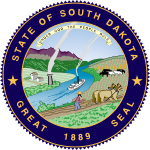| |||||||||||||||||
| |||||||||||||||||
 County results Jensen: 50–60% 60–70% 70–80% Berry: 50–60% 60–70% | |||||||||||||||||
| |||||||||||||||||
| Elections in South Dakota |
|---|
 |
The 1936 South Dakota gubernatorial election was held on November 3, 1936. Incumbent Democratic Governor Tom Berry ran for re-election to a third term, the first Governor of South Dakota to do so.[1] Berry was challenged by Republican Leslie Jensen, the former Collector of Internal Revenue for the state of South Dakota.[2] Both Berry and Jensen won their primaries uncontested and advanced to the general election.[3] Some drama surrounded the potential candidacy of Democratic State Auditor George O'Neill as an independent candidate for Governor or, in the alternative, his cross-party endorsement of Jensen; after initially announcing his campaign and hedging, O'Neill dropped out of the race in September and endorsed the Democratic ticket in the state, including Berry.[4]
The primary issue during the campaign was the drought caused by regional dust storms as part of the Dust Bowl. Republicans attacked Governor Berry's administration for providing inadequate relief to South Dakotan farmers.[5] But Berry's willingness to break the state's unwritten political tradition by seeking a third term was apparently controversial[citation needed]. In the closing days of the campaign, Herbert E. Hitchcock, the Chairman of the South Dakota Democratic Party, emphasized how unwilling Berry had been to seek a third term: "Tom Berry was forced into running for a third term by Democrats and Republicans alike. I, among others, insisted that he lay aside his personal wishes and become a candidate because I felt and thoughts of others felt he owed it to the state of South Dakota to do so."[6]
However, despite Berry's wide victories in 1932 and 1934, he narrowly lost re-election to Jensen. However, President Franklin Roosevelt carried the state by a fairly wide margin, and Democratic Senator William J. Bulow narrowly won re-election.
- ^ "Governor Berry Announces Will Seek 3rd Term: Announcement Which Has Agitated Political Discussions For Weeks Is Made Today". Argus Leader. Sioux Falls, S.D. February 18, 1936. p. 1. Retrieved June 13, 2021.
- ^ "Leslie Jensen Is Candidate for Governor". Lead Daily Call. Lead, S.D. February 6, 1936. p. 1. Retrieved June 13, 2021.
- ^ "Entry Into Primary Election Contest for Nominations Is Completed; All Petitions In". Lead Daily Call. Lead, S.D. April 6, 1936. p. 1. Retrieved June 13, 2021.
- ^ "O'Neill Now To Support Democrats". Lead Daily Call. Lead, S.D. September 25, 1936. p. 2. Retrieved June 13, 2021.
- ^ "Jensen Scores Relief Program". Rapid City Journal. Rapid City, S.D. July 15, 1936. p. 2. Retrieved June 13, 2021.
- ^ "Hitchcock Says Berry Drafted: His Third-Term Argument Of Republicans; Praises Record Of Governor". Evening Huronite. Huron, S.D. October 31, 1936. p. 8. Retrieved June 13, 2021.

